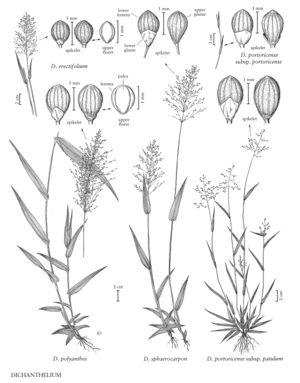Dichanthelium erectifolium
Plants cespitose, with few culms. Basal rosettes well-differentiated; blades numerous, to 15 cm, lowest blades ovate, upper blades lanceolate, grading into the cauline blades. Culms 30-75 cm, nearly erect, stiff, slightly fleshy or thickened; nodes glabrous, often with a constricted, yellowish ring; internodes glabrous; fall phase with few, long, suberect branches, sparingly rebranched, branches arising mostly from near the base. Cauline leaves 4-7; sheaths shorter than the internodes, mostly glabrous, margins ciliate; ligules 0.2-0.5 mm; blades 5-10 cm long, 5-10 mm wide, stiffly ascending, thick, glabrous, veins evident, bases cordate, with papillose-based cilia, margins whitish, cartilaginous. Primary panicles 5-14 cm, 1/2 - 2/3 as wide as long, exserted. Spikelets 1-1.4 mm, broadly obovoid-spherical, puberulent to subglabrous. Lower glumes 0.2-0.4 mm, acute, upper florets 0.8-1.1 mm, broadly ellipsoid, minutely umbonate. 2n = unknown.
Distribution
Ga., La., Ala., N.C., S.C., Miss., Fla.
Discussion
Dichanthelium erectifolium grows in sand and peat in wet pinelands, bogs, and the shores of ponds. Its range extends from the southeastern Flora region into the Caribbean.
Selected References
None.
